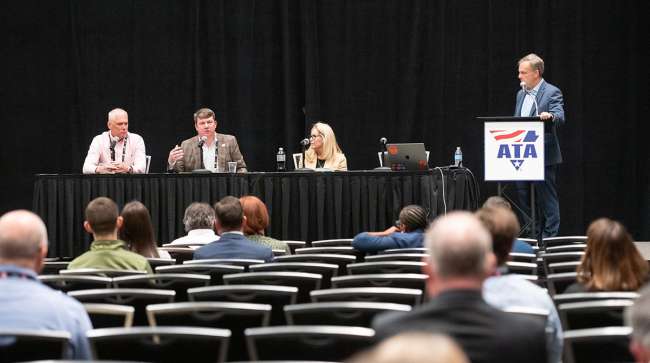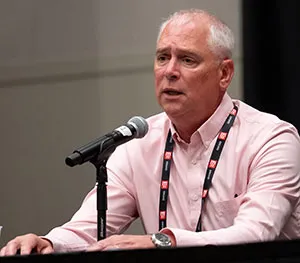Staff Reporter
How Trucking Tackles a Tough Labor Market

[Stay on top of transportation news: Get TTNews in your inbox.]
AUSTIN, Texas — The trucking industry is working to overcome employment obstacles amid a tightening labor market and soft economy, a panel of experts said Oct. 16 during American Trucking Associations’ 2023 Management Conference & Exhibition.
“The economic outlook is not fantastic, but obviously it’s not terrible,” said Lee Klaskow, a senior global transportation and logistics analyst at Bloomberg. “The unemployment level — you can see — is inching up, and I think that’s very important to look at. We’re talking about labor, so you can see that the labor market is going to get a little looser over time. But it’s still pretty tight.”
Recruiting younger people to trucking is a key goal, but the industry must work to overcome preconceived notions that the industry is behind the times, said Brent Vander Pol, president of Peninsula Truck Lines.
“That is a real challenge for us,” he said. “The view of our industry by the general public is still one of old and stodgy, and to attract the younger people — it’s difficult to do. We get into as many schools as we can, to get in front of graduating high school seniors and make sure they know the opportunities.”

Brent Vander Pol says, "We get into as many schools as we can, to get in front of graduating high school seniors and make sure they know the opportunities.” ( Erin Granzow for American Trucking Associations)
Vander Pol stressed that these opportunities stretch beyond driving positions to jobs in finance and risk management. His company works to ensure students know about these opportunities.
Shaping opinions early is key, added Wes Davis, president of Big M Transportation.
“One of the main things we do is we go into the schools starting with middle school,” he said. “We have high school and middle school kids come through our terminal, through our offices, see all our facilities. It seems like weekly people are coming through.” Davis said these visits are used to promote truck driving jobs along with other positions the industry has available.
Big M also is a supporter of Trucking U, an ATA educational initiative that provides students at business schools and universities with trucking networking and mentorship opportunities. “We sponsor that [program] and participate in it,” Davis said.
Davis also noted that his company is active on social media, and set up a studio in its terminal to create online videos and promote brand awareness.
Vander Pol noted that recruiting for middle management posts is particularly challenging.
Trimble CEO Rob Painter discusses the company’s continued investment in the freight transportation industry and its vision for a more connected supply chain. Tune in above or by going to RoadSigns.ttnews.com.
“The executives, we can get those on board relatively easy,” he said. “The frontline people, it’s easier to bring them on. It’s that middle management piece that we’re struggling to put people in place.”
A provider of outsourcing services noted that it can provide help to companies struggling to find the right people to fill jobs.
“Anything that any of the companies in the [third-party logistics], [less-than-truckload], full truckload markets have within house — aside from drivers — we can assist with,” said Donna Kintop, senior vice president of client experience at DDC Freight Process Outsourcing. “What we find in working with a lot of our partners is that they’re moving a little bit slower, they’re making decisions a little bit slower, they are making sure that they optimize resources. So, any roles that can be blended, any skill sets that can be blended, they’re establishing that in-house.”
Kintop noted that carriers are rewriting standard operating procedures while making sure their training is up to date, and working to position themselves to be flexible whether the freight market grows or shrinks.
“We have used outsourcing,” Davis said, noting that the company’s location makes recruiting more challenging. “We live in a fairly remote area so finding the talent pool there is definitely a little more challenging than say a New Jersey or an Indianapolis or some other larger city. So, we have looked at outsourcing. Some of the things we’ve done there is the information technology piece.”
Want more news? Listen to today's daily briefing above or go here for more info
Peninsula Truck Lines also pays overtime to help it adjust to changes in the freight cycle. The carrier will provide overtime opportunities during its busy times of year if it is unable to bring on additional people to match the increased demand.
“The baseline is your slowest part of the year, whatever that might be,” Vander Pol said. “For us, it’s fourth quarter and first quarter. And there’s very little overtime or additional miles that our drivers and frontline people have available to them in those quarters. As it gets busier once spring comes around, then we’re able to absorb that with a little bit of overtime.”





